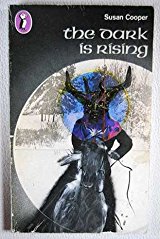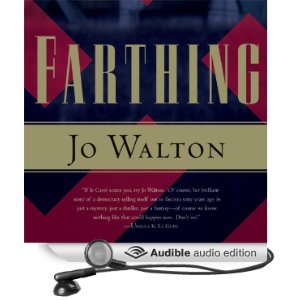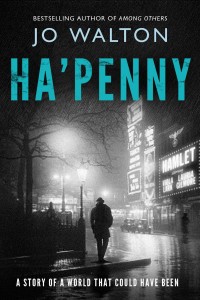 I think if I were to read The Dark is Rising for the first time now, it would be a very different book. I was thirteen when I first read it on the beach in Hastings. Hastings is a town in south-east England, about as east as you can get and still be on the south coast, in Elizabeth I’s map of Britain as a woman, it would be the tip of the toe of the drawn in leg, while Cornwall is the leg that kicks out. The first book in Cooper’s sequence, Over Sea, Under Stone, is set in Cornwall. None of the books are set in Hastings, that’s just where I happened to have washed up in the summer of 1978, when I was thirteen. It was the summer after my grandfather had had a stroke and was in hospital trying to recover, and I was in Hastings staying with his sister, my Auntie Flo, who was my great-aunt really. I was there because she offered to have me, and to get away from my mother. My whole life for years was all about getting away from my mother. If this sounds familiar, well there you go.
I think if I were to read The Dark is Rising for the first time now, it would be a very different book. I was thirteen when I first read it on the beach in Hastings. Hastings is a town in south-east England, about as east as you can get and still be on the south coast, in Elizabeth I’s map of Britain as a woman, it would be the tip of the toe of the drawn in leg, while Cornwall is the leg that kicks out. The first book in Cooper’s sequence, Over Sea, Under Stone, is set in Cornwall. None of the books are set in Hastings, that’s just where I happened to have washed up in the summer of 1978, when I was thirteen. It was the summer after my grandfather had had a stroke and was in hospital trying to recover, and I was in Hastings staying with his sister, my Auntie Flo, who was my great-aunt really. I was there because she offered to have me, and to get away from my mother. My whole life for years was all about getting away from my mother. If this sounds familiar, well there you go.
My Auntie Flo lived in a tall narrow Victorian house full of stairs, and so far so comforting, that’s what I was used to at home. She lived in it with her husband, one grown son and his wife and little kids, and one grown daughter and her husband and middle sized kids. They were all as friendly and welcoming as was in their natures to the prickly teenager that was me, who wanted — well, I wanted people who were dead to be alive again, and I wanted to be a child with a home, or failing that a grown up with a home. As I couldn’t get what I wanted, I settled for being left in peace to read my book. This was not the weirdest thing any of them had ever heard of. John, one of Auntie Flo’s seven kids had been the same. I was told so many times I was just like John that I developed a great affinity for him without ever having met him.
By that time I’d read everything in the house. I hate it when people think I’m boasting about my reading speed, because why would I? It was 1978. There wasn’t any internet. There were only varyingly kind varyingly weird semi-stranger relations to talk to, who had nothing in common with me. Lack of things to read was like an ache. If I could have read slower and still been able to be absorbed in the book while the book lasts, don’t you think I would have?
Hastings has a beach, which is all pebbles, and utterly inferior to the sandy coves of South Wales, or for that matter Cornwall. It also has little steep streets of shops that always reminded me a bit of Roke in the Earthsea books, because it was easy to get twisted around and lost. It had a place that printed t-shirts. It had a place that sold belgian waffles. I was given a small amount of pocket money so I could sometimes buy a waffle but didn’t have enough for books. I was allowed out on my own, as long as I was on time for meals, and spent a lot of time wandering around, and also on the inadequate beach.
I had read every single book in the house, including books much too young for me and the soft porn Emmanuelle, which I found hidden, and replaced back into hiding when I’d finished it. I had borrowed a library card from a cousin two years younger and read everything in the children’s section of the library. They were not going to let me read things from the grown-up section with a card with a date-of-birth that said eleven, and they strongly discouraged me sitting in the library reading all of grown up books, though I often did it anyway on wet days until chased out. Non-fiction was safer than fiction from that point of view, and I read a lot of anthropology and folklore. (This was after I’d read the SF section of Aberdare library in alphabetical order, Poul Anderson to Roger Zelazny.)
I’ve just remembered the most peculiar thing. It has nothing to do with this story, to which I was about to get to the point, but I’ve thought about it for a long time because it makes no sense. Auntie Flo’s daughter, my cousin Judy, who was mostly looking after me and seeing I ate and wore clean clothes on Sundays, offered me a book by Malcolm Saville belonging to her son. Later she asked me if I liked it. I said I hadn’t much, and that I didn’t like Saville generally. Then she said “We don’t pay any attention to author’s names in this house,” as if I was at fault to do so. This remains as inexplicable a remark to me now as it did then.
Anyway, one of the books I read from the library there was Over Sea, Under Stone. I liked it. It’s a pretty good childrens book.
Then John came to visit with his wife and kids, and his brother, sister, nieces and nephews, father, and mother, all told him I was a bookworm. He had kids of his own, older than me. He wasn’t as interested in me as I was in him — of course he wasn’t — but he did take me to a little bookshop and say he would buy me any three books I wanted. The three books I bought were Mary Renault’s The Bull From the Sea, Heinlein’s The Past Through Tomorrow and The Dark is Rising. It was a remarkably kind thing to do. I have always been grateful, and I remain grateful to this day. I don’t know if I could possibly have sufficiently expressed my gratitude. I hope I wasn’t just surly. (Losing my home and everyone I cared about coincided so specifically with adolescence that I had no idea until my son was that age how much of my misery was due to my age and how much to circumstances. The circumstances sucked, but also, I was thirteen.)
I still have the first two of those books I bought that day in Hastings, the actual copies. But when my first husband and I merged out book collections I had to admit that his copy of The Dark is Rising was in much better condition than mine so we got rid of mine, and the one I have now is his. (When we de-merged our book collections, I got all the childrens books because I was also keeping the child.) But it’s the same edition, the one whose cover I’ve put in this post, so it feels like the same book.
As you can probably imagine, I’ve re-read The Dark is Rising a bunch. I read it a large number of times that summer, and I’ve read it aloud to my son, and I’ve read with the series, and without the series, and at Christmas as a standalone. I am extremely fond of it.
The first chapter does a wonderful job of introducing Will, and Will’s slightly worried point of view. It introduces his family without ever stopping to introduce them, and it shows us the way he is rooted among the forest of the others, both seen and unseen. It shows us and begins to characterise James, Mary, and Paul, and gives us the beginnings of shape on Steven and Max. It shows us the Dawson farm, with Maggie Barnes, Old George, and Farmer Dawson — two Old Ones and a recruit of the Dark, though we don’t know that yet. It shows us the Walker, and does the splendid unease of the animals and the radio reacting weirdly to Will on the eve of his birthday. And Will gets given the first sign. The uncanny blends into the everyday perfectly, the rooks, James forgetting the attack, the fear in the night. It’s a perfect first chapter, setting up a whole lot of things that will be important, setting up the atmosphere, not wasting any time or any words.
I read it sitting on the pebbles in watery sunshine. I started it after going out after breakfast — I’d finished The Bull From the Sea the evening before. I didn’t notice it was a chapter because I certainly kept turning the page. I read the whole book twice that day. I think I spent about a paragraph sad that it had a different character from Over Sea Under Stone, and then I just went into it and wasn’t thinking and wasn’t me and wasn’t sitting on a pebble beach in August but was utterly caught up in being Will.
If I read it for the first time now, I think I’d still like it and still notice these things about it. But it would be a different book, and not only that, but I’d be a different me.



